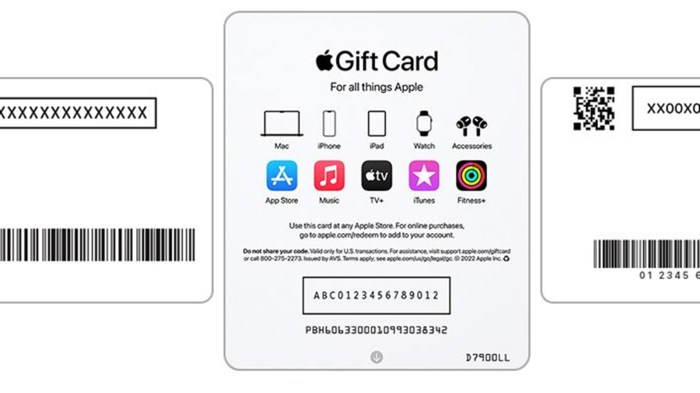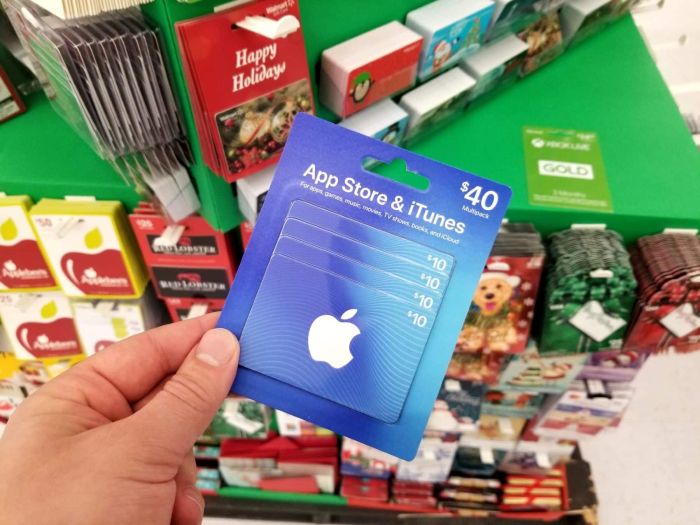Apple’s Warning: Apple Warns Itunes Gift Card Scams
Apple has issued warnings about iTunes gift card scams, urging users to be vigilant and avoid falling prey to these fraudulent schemes. These scams often target unsuspecting individuals, exploiting their trust and desperation to obtain quick assistance or resolve urgent issues.
iTunes Gift Card Scam Tactics
The iTunes gift card scam typically involves a scammer posing as a representative from a reputable organization, such as a government agency, utility company, or tech support service. They contact victims via phone calls, emails, or text messages, claiming that the victim owes money or needs to pay a fee to resolve an urgent issue.
- The scammer might claim that the victim’s account is locked, their computer is infected with a virus, or they have missed a payment.
- They then instruct the victim to purchase an iTunes gift card as a form of payment, often pressuring them to act quickly to avoid further consequences.
- Once the victim provides the gift card code, the scammer can redeem it for cash, leaving the victim with nothing but a fraudulent claim and a financial loss.
Apple’s Official Warning
Apple has explicitly stated that they will never ask for payment in the form of iTunes gift cards. They emphasize that legitimate companies and organizations will not use iTunes gift cards for payments. Apple’s official warning, found on their website and support pages, states:
“Apple will never ask you to pay for support with an iTunes Gift Card.”
Types of iTunes Gift Card Scams
iTunes gift card scams can manifest in various ways, each exploiting different vulnerabilities and targeting specific audiences.
- Tech Support Scams: These scams involve scammers posing as tech support representatives, claiming to have detected issues with the victim’s computer or device. They then instruct the victim to purchase an iTunes gift card to pay for “repairs” or “virus removal.”
- Government Impersonation Scams: Scammers may pretend to be from government agencies, such as the IRS or Social Security Administration, claiming that the victim owes money or is facing legal action. They demand payment in the form of iTunes gift cards to avoid penalties.
- Utility Company Scams: These scams involve scammers posing as representatives from utility companies, claiming that the victim’s service is about to be disconnected due to an unpaid bill. They demand payment in the form of iTunes gift cards to avoid service interruption.
Scam Tactics
iTunes gift card scams are a prevalent issue, and scammers employ various deceptive tactics to trick users into handing over their gift card codes. These scams often target individuals seeking help or support, preying on their vulnerability and desperation.
Phishing Emails and Websites, Apple warns itunes gift card scams
Scammers frequently use phishing emails to lure unsuspecting victims. These emails often mimic legitimate messages from Apple or other trusted organizations. They might claim that your account is in danger, require you to update your information, or offer a special promotion. These emails usually contain a link to a fake website designed to look identical to the real Apple website. The fraudulent website will then prompt you to enter your iTunes gift card code, giving the scammer access to your gift card balance.
Example: A phishing email might claim that your Apple ID is about to expire and require you to update your account information by clicking on a provided link. The link will lead to a fake Apple website that asks for your iTunes gift card code.
Social Media Posts
Scammers also use social media platforms to spread their scams. They may create fake profiles or impersonate legitimate organizations to gain the trust of potential victims. They might offer giveaways, discounts, or other enticing offers in exchange for your iTunes gift card code.
Example: A fraudulent social media post might advertise a giveaway of a new iPhone in exchange for following the account and providing your iTunes gift card code.
Exploiting Trust and Urgency
Scammers often exploit trust and urgency to convince their victims to act quickly. They might create a sense of urgency by claiming that your account is in danger, or that you need to act immediately to claim a limited-time offer. They may also use emotional manipulation, such as pretending to be in need of financial assistance.
Example: A scammer might contact you claiming to be a family member in an emergency and request your iTunes gift card code to purchase medical supplies.
Protecting Yourself
Scammers are constantly evolving their tactics, so it’s crucial to be vigilant and take proactive steps to protect yourself. By understanding common scam techniques and knowing where to turn for help, you can significantly reduce your risk of falling victim.
Identifying Potential Scams
It’s essential to be aware of the common tactics scammers use to lure unsuspecting individuals. Here are some key indicators that a message or communication might be a scam:
- Urgency: Scammers often create a sense of urgency, pressuring you to act quickly before you have time to think things through. For example, they might claim you need to act immediately to claim a prize or avoid losing access to your account.
- Suspicious Links: Be cautious of links in emails or text messages that seem too good to be true, especially if they lead to unfamiliar websites. These links might redirect you to fake websites designed to steal your personal information.
- Grammar and Spelling Errors: While not always a definitive sign, poor grammar and spelling errors can be a red flag, indicating a scam. Legitimate organizations typically pay attention to detail in their communications.
- Requests for Personal Information: Legitimate companies will never ask for sensitive information like your Social Security number, bank account details, or credit card information through unsolicited emails or text messages.
Verifying Information from Official Sources
If you receive a message that seems suspicious, it’s crucial to verify the information from official sources.
- Check Apple’s Website: For any communication related to Apple services or products, visit the official Apple website for information about their policies and procedures.
- Contact Apple Support: If you have doubts, contact Apple Support directly through their official website or phone number. They can provide accurate information and assist you in verifying the legitimacy of any communication.
Reporting Suspected Scams
If you suspect you’ve encountered a scam, it’s essential to report it to the appropriate authorities.
- Report to Apple: Apple has a dedicated page for reporting scams related to their products and services. You can provide details about the scam and any evidence you have.
- Contact Your Local Law Enforcement: If you believe you’ve been a victim of a scam, contact your local law enforcement agency to file a report. They can investigate the matter and provide guidance on how to protect yourself from further harm.
- Report to the Federal Trade Commission (FTC): The FTC is a federal agency that investigates and combats consumer fraud. You can report scams to the FTC through their website or by phone.
Consequences of Scams
iTunes gift card scams can have serious consequences for victims, causing not only financial losses but also significant emotional distress. Understanding the full impact of these scams is crucial for protecting yourself and others.
Financial Losses
The financial losses associated with iTunes gift card scams can be substantial. Victims may lose hundreds or even thousands of dollars depending on the amount of gift cards they purchase. These scams often target individuals who are vulnerable or desperate, making them more susceptible to pressure tactics and manipulation. The loss of funds can have a devastating impact on a person’s financial stability, especially if they are already struggling financially.
Emotional Impact
Being scammed can be a deeply upsetting and demoralizing experience. Victims may feel embarrassed, ashamed, and violated. The emotional impact can be significant, leading to feelings of anxiety, depression, and even anger. The trust in others may be shaken, and the experience can leave lasting psychological scars.
Difficulties in Recovering Lost Funds
Recovering lost funds from iTunes gift card scams is often extremely difficult, if not impossible. Once the gift card codes are redeemed, the money is essentially gone. Scammers often use untraceable payment methods and operate from overseas, making it challenging for authorities to track them down.
Apple warns itunes gift card scams – The rise of iTunes gift card scams highlights the need for vigilance in the digital age. By staying informed, verifying information, and reporting suspicious activity, we can protect ourselves from falling victim to these deceptive schemes. Remember, if something seems too good to be true, it probably is.
Apple’s been warning folks about iTunes gift card scams, and while that’s a bummer, there’s some good news on the horizon. Apple’s also been busy patenting new wireless charging plans, like the ones described in this recent patent. So, while you’re dodging those iTunes scammers, you can dream about a future where charging your devices is as easy as setting them down.
 Standi Techno News
Standi Techno News

